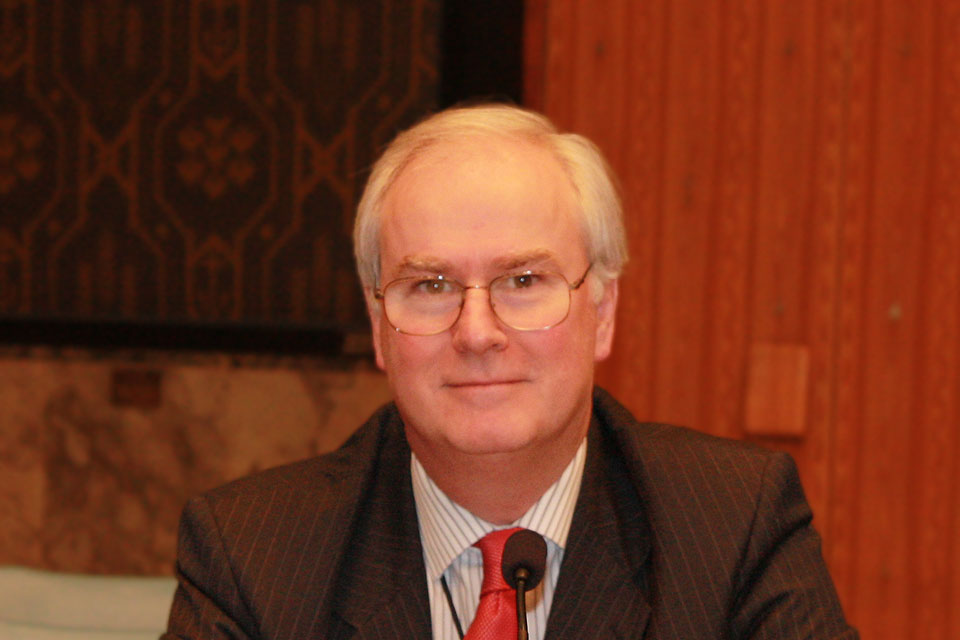Permanent Representative of the UK Mission to UN reviews year, looks ahead to 2015
Intervention by Ambassador Lyall Grant of the UK Mission to the UN, to the Security Council Wrap Up Session for December.

Thank you Mr President,
I congratulate you and the Chadian Mission on having steered the Council through a busy and compressed month. The two open debates and the Sahel briefing brought the African perspective into sharper focus. Holding this wrap-up in public provides an opportunity to review the year and to look ahead to 2015.
Looking back, there have been a number of issues where the Council has shown clarity of purpose and taken decisive action. But there have also been issues where the Council has been divided and therefore not been able to respond effectively.
Our work on counter-terrorism and in particular responding to the abhorrent threat of ISIL is an example where the Council has had a shared analysis. Resolutions adopted this year have sought to address terrorist financing, through kidnapping for ransom and oil sales. We have also tackled the issue of foreign terrorist fighters and, just last Friday, the link between terrorism and trans-national organised crime. The Council’s many press statements in response to terrorist outrages, most recently following the sickening attack in Peshawar, are quickly agreed. Council members share the same determination: to combat all forms of terrorism, considering it one of the most serious threats to international peace and security.
Another area where we have made progress is on the issue of Syrian chemical weapons and responding to the humanitarian crisis in Syria. Both have needed the Council’s sustained pressure and attention to ensure follow-up action, and we shall need to maintain that focus following the adoption of resolution 2191.
There has also been progress on peacekeeping. In the Central African Republic, the transition from an AU mission to MINUSCA was considerably smoother than the equivalent transition last year in Mali. More generally, we have held a number of debates and retreats on peacekeeping this year which revealed a shared analysis that peacekeeping needs a close re-examination. The use of new technology; the size, configuration and capabilities of missions; the ever more complex operational environments; the speed of deployment; exit strategies; effective planning. All these are challenges that UN peacekeeping will need to address in order to develop a model of peacekeeping for the 21st century. The Secretary-General’s Peace Operations Review is looking at all these issues and more. I look forward to the Council considering the Review next year and hope that we can maintain a shared analysis as we do so.
Mr President,
On the debit side of the ledger, the Council has still not been able to make progress on the political aspects of the Syrian conflict. We all agree that the only sustainable solution is a political one, built on the Geneva Communiqué. But, so far, we have failed to take the sort of action that creates conditions conducive to that end. Meanwhile, President Assad continues to wage an indiscriminate and brutal war on his own people.
Despite the international outcry at Russia’s illegal intervention in Ukraine, the situation remains unresolved. Everybody has lost as a result and states with big neighbours will be warier for it. Nor are Russian actions limited to Ukraine. The signature of an agreement between Russia and the Georgian region of Abkhazia on 24 November reminds us that what we have seen over the past year is part of a pattern of Russia systematically interfering in its neighbours’ domestic affairs and undermining their sovereignty and territorial integrity. The world has to respond when countries so blatantly disregard respect for international borders and norms. And this Council should be the guardian of those norms when it comes to maintaining international peace and security, as set out in the UN Charter.
Mr President,
To finish, let me add a third category: where the Council shares the same analysis, but the action it takes does not have the desired effect. This has been true in Darfur and South Sudan, and so far at least, in Libya and the DRC. The reasons are different in each case, but we shall need to address each of them in the early part of 2015.
Mr President,
As this is almost the last meeting in the Chamber of your Presidency and of 2014, let me take the opportunity to note and thank the five out-going members Argentina, Australia, Luxembourg, Republic of Korea and Rwanda for their extraordinary and valuable contributions over the last two years. There is not time to enumerate all the achievements. Suffice it to say that, while it is sometimes alleged that the Permanent members dominate all Security Council business, you have all shown that that is far from the case. And let me also welcome our five new colleagues, joining us on 1 January. We look forward to working with you all. And I wish the Chilean Presidency the best of luck in the month of January.
Thank you.